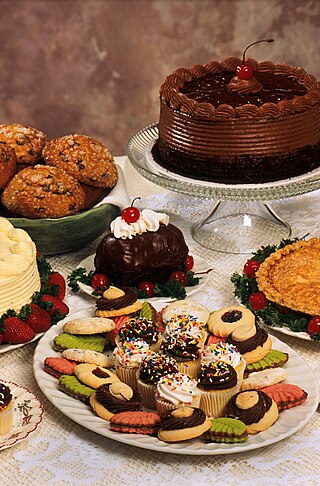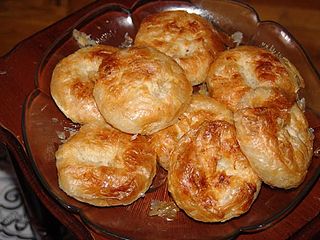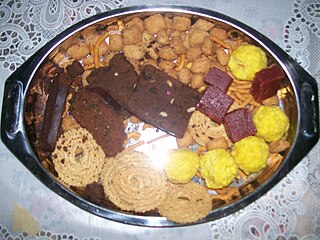
Dessert is a course that concludes a meal. The course consists of sweet foods, such as cake, biscuit, ice cream and possibly a beverage such as dessert wine and liqueur. Some cultures sweeten foods that are more commonly savory to create desserts. In some parts of the world there is no tradition of a dessert course to conclude a meal.

Brazilian cuisine is the set of cooking practices and traditions of Brazil, and is characterized by European, Amerindian, African, and Asian influences. It varies greatly by region, reflecting the country's mix of native and immigrant populations, and its continental size as well. This has created a national cuisine marked by the preservation of regional differences.
Jamaican cuisine includes a mixture of cooking techniques, flavours and spices influenced by Amerindian, West African, Irish, English, French, Portuguese, Spanish, Indian, Chinese and Middle Eastern people who have inhabited the island. It is also influenced by the crops introduced into the island from tropical Southeast Asia, many of which are now grown locally. A wide variety of seafood, tropical fruits and meats are available.

An Eccles cake is a small, round pie, similar to a turnover, filled with currants and made from flaky pastry with butter, sometimes topped with brown sugar.

Sri Lankan cuisine is known for its particular combinations of herbs, spices, fish, vegetables, rices, and fruits. The cuisine is highly centered around many varieties of rice, as well as coconut which is a ubiquitous plant throughout the country. Seafood also plays a significant role in the cuisine, be it fresh fish or preserved fish. As a country that was a hub in the historic oceanic silk road, contact with foreign traders brought new food items and cultural influences in addition to the local traditions of the country's ethnic groups, all of which have helped shape Sri Lankan cuisine. Influences from Indian, Indonesian and Dutch cuisines are most evident with Sri Lankan cuisine sharing close ties to other neighbouring South and Southeast Asian cuisines.

A rice cake may be any kind of food item made from rice that has been shaped, condensed, or otherwise combined into a single object. A wide variety of rice cakes exist in many different cultures in which rice is eaten. Common variations include cakes made with rice flour, those made from ground rice, and those made from whole grains of rice compressed together or combined with some other binding substance.

Kue are bite-sized snacks or desserts originally from what is now Indonesia but have since spread throughout Southeast Asia. Kue is a fairly broad term in Indonesian to describe a wide variety of snacks including cakes, cookies, fritters, pies, scones, and patisserie. Kue are made from a variety of ingredients in various forms; some are steamed, fried or baked. They are popular snacks in Indonesia, which has the largest variety of kue. Because of the countries' historical colonial ties, Koeé (kue) is also popular in the Netherlands.

Sephardic Jewish cuisine, belonging to the Sephardic Jews—descendants of the Jewish population of the Iberian Peninsula until their expulsion in 1492—encompassing traditional dishes developed as they resettled in the Ottoman Empire, North Africa, and the Mediterranean, including Jewish communities in Turkey, Greece, Bulgaria, North Macedonia, and Syria, as well as the Sephardic community in the Land of Israel. It may also refer to the culinary traditions of the Western Sephardim, who settled in Holland, England, and from these places elsewhere. The cuisine of Jerusalem, in particular, is considered predominantly Sephardic.

Kuswar or Kuswad is a set of festive sweets and snacks made and exchanged by Christians of the Konkan region in the Indian subcontinent for the Christmas season or Christmastide. These goodies are major parts of the cuisines of the Goan Catholic community of Goa in the Konkan region, and the Mangalorean Catholic community of Karnataka. There are as many as 22 different ethnic recipes that form this distinct flavour of Christmas celebration in Goa and Mangalore. Kuswad is also made and exchanged by Karwari Catholics of Carnataca and the Kudali Catholics of Sindhudurg, in the Konkan division of Maharashtra.

Toto is a small coconut cake in Jamaican cuisine served as a snack or dessert. The cake is typically prepared with shredded coconut, brown sugar, flour, baking soda and powder, and coconut milk. It may also be added with some flavorings such as allspice, nutmeg, ginger, and salt.

Betawi cuisine is rich, diverse and eclectic, in part because the Betawi people that create them were composed from numbers of regional immigrants that came from various places in the Indonesian archipelago, as well as Chinese, Indian, Arab, and European traders, visitors and immigrants that were attracted to the port city of Batavia since centuries ago.










